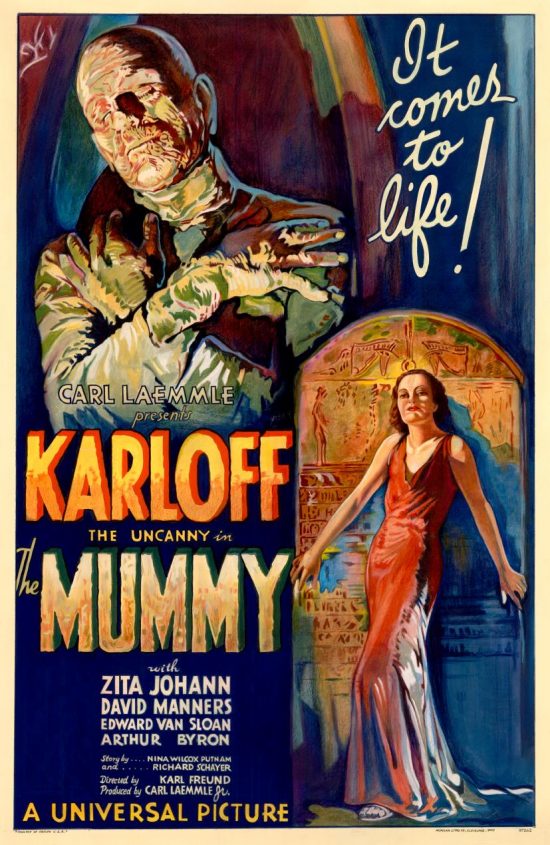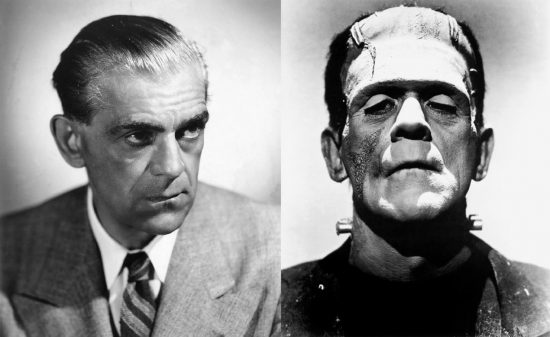Plymouth College of Art presents Boris Karloff: The Many Faces of a Film Icon – an online symposium
Plymouth College of Art will be hosting an online symposium dedicated to one of the great stars of the classic Hollywood era, Boris Karloff: The Many Faces of a Film Icon, on Friday April 1 2022.
The event will explore various aspects of the fascinating life and career of one of the most enduring figures of screen culture, drawing together a range of approaches to Karloff and his work from academics and artists alike, supported by keynote addresses from all-round horror expert Dr Alison Peirse (University of Leeds) and acclaimed Karloff biographer Stephen Jacobs, author of Boris Karloff: More Than a Monster (2010).
Accompanying the day of presentations and discussion, attendees will have access to a dedicated website where there will be a showcase of unique archival materials, as well as artist responses to Karloff and his career. Artists’ responses include author and actor Charlie Higson’s prize-winning animated film, based on Boris Karloff’s most iconic performances, which won Plymouth College of Art’s Boris Karloff 60-Second Film Challenge.
As a finale to the symposium, for those local to Plymouth or who can join in person, there will be screenings of two of Karloff’s films at the Plymouth Arts Cinema, located at Plymouth College of Art. The Mummy (dir. Karl Freund, 1932, cert. 15) will be shown from 6pm with an introduction by Dr Eddie Falvey, followed by The Old Dark House (dir. James Whale, 1932, cert. PG) at 8.30pm.
This event has been organised by the Boris Karloff Symposium Committee, made up of academics from Plymouth College of Art including Head of School of Design + Communication Peter Barker, Lecturer Dr Eddie Falvey, Head of Academic Research Professor Judith Noble, Assistant Head of School of Arts + Media Lucy Leake, plus Director and Film Programmer of Plymouth Arts Cinema Anna Navas. Plymouth College of Art’s Head of School of Design + Communication, Peter Barker, is Boris Karloff’s great nephew and was a catalyst for the symposium’s creation. He has explored his familial connection in a specially curated exhibition for the event, available online. The collection of archival photographs offer a glimpse into Karloff’s British family and history.
Dr Eddie Falvey is an early career researcher and lectures in the School of Arts and Media at Plymouth College of Art. Eddie completed his AHRC funded PhD at the University of Exeter in 2018, work that forms the basis of his forthcoming monograph New York in Early Films: The Archive and the City (University of Amsterdam Press, forthcoming). He is author of the Devil’s Advocates volume Re-Animator (Liverpool University Press, 2021), editor of The Cinema of Yorgos Lanthimos: Films, Form, Philosophy (Bloomsbury, 2022) and co-editor of New Blood: Critical Approaches to Contemporary Horror (with Joe Hickinbottom and Jonathan Wroot, University of Wales Press, 2020). Elsewhere, he has had work published in a number of journals and edited collections.
Boris Karloff was born William Henry Pratt in 1887 in the village of Camberwell, Surrey, now South London. Most often remembered as the star of Frankenstein (dir. James Whale, 1931) and its sequels, Karloff’s career spanned more than half a century, from Canada to silent era Hollywood to its golden age to New Hollywood some decades later when he worked with Peter Bogdanovich on the highly experimental film Targets (1968) in what proved to be one of his final, though no less impressive, feature performances. Beside his collaborations with Whale and Bogdanovich, Karloff traversed a range of industry contexts in which he worked under a number of significant directors over the course of his career, including Mario Bava, Roger Corman, Michael Curtiz, John Ford, Howard Hawks, Michael Reeves, Douglas Sirk, Jacques Tourneur and Robert Wise. Now a cult icon of the silver screen, for many Karloff was and remains “one of the screen’s greatest madmen” (Darryl Jones, 2002). This day is an opportunity to explore that fact, as well as other parts of Karloff’s enduring legacy.
Tickets for Boris Karloff: The Many Faces of a Film Icon are available for £10 to the general public and free to staff and students at Plymouth College of Art. Register to attend on Eventbrite.
Thank you for supporting Live for Films (LFF) when you order using the link below. As an Amazon Associate LFF earns from qualifying purchases. If you are using an adblocker you will not see the link.











